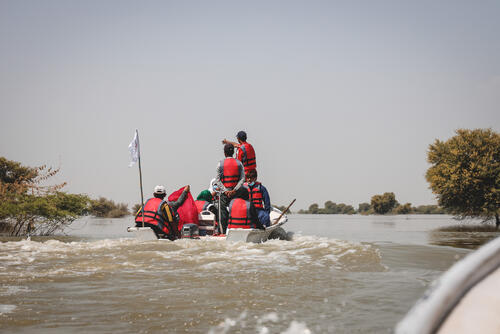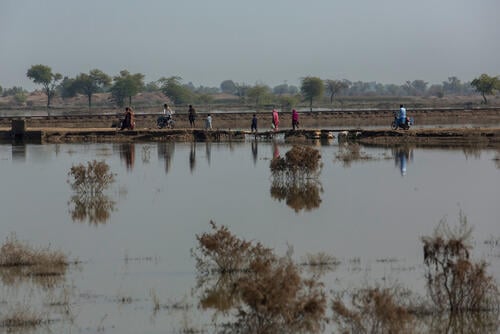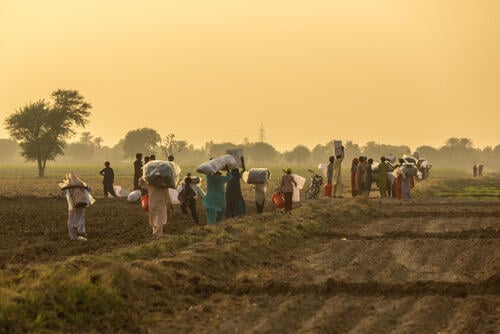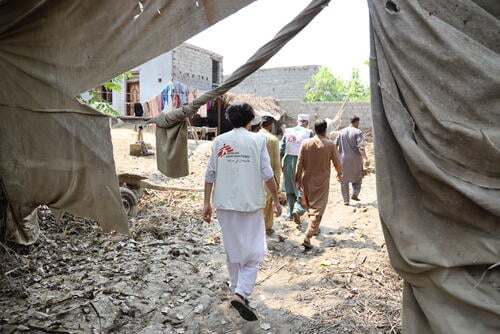It has been seven weeks since the flood emergency was declared in Pakistan, following heavy monsoon rains that started in June. The death toll is now over 1,700 and it is thought that over 33 million people have been affected across all of Pakistan’s provinces.
From hilly areas to plains, the flooding has washed away houses, infrastructure, crops, and livestock. Our teams have seen villages near the riverbanks flooded up to 3.5 metres deep. Many villages are still flooded, and most displaced people cannot return to their homes. Many are staying in tent camps, in temporary facilities, or in the open air without adequate shelter. The floodwaters are stagnant in many areas, causing water-borne and vector-borne diseases to spread.
The need for clean drinking water is still very high, as water sources are largely contaminated. Food security is also of concern as crops and livestock have been destroyed and many households are left with limited resources.
Response across Pakistan
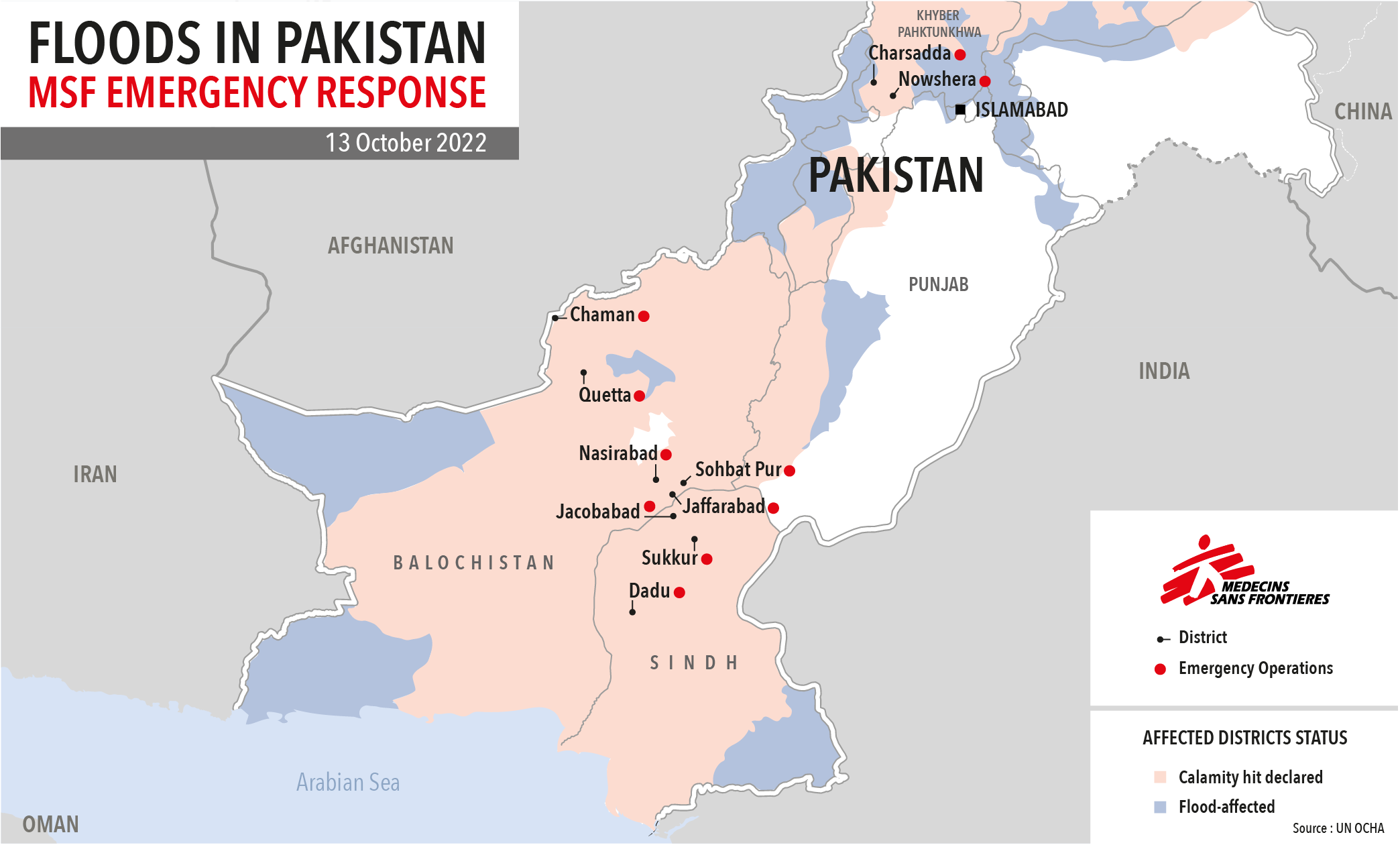
Médecins Sans Frontières (MSF) teams have been responding and assessing needs in Pakistan since August. We are responding in Sindh, Balochistan and Khyber Pakhtunkuwa provinces. We're also looking to respond in Punjab province.
Our response includes providing clean drinking water and distributing non-food item relief kits - such as soap, mosquito nets, and kitchen tools - to families. MSF teams have been treating people for skin and eye infections, acute diarrhoea, respiratory infections, malaria, malnutrition, and chronic diseases through mobile clinics.
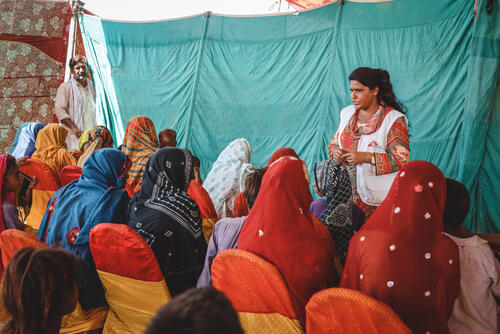
Response in Sindh province
Most people displaced by the floods in Sindh province are still living in camps and temporary shelters with limited access to basic necessities. Some villages are still out of reach due to inaccessible roads and high-water levels and access to remote areas continues to be a challenge for us and other humanitarian organisations.
The water and sanitation needs in the affected areas are still enormous and we can expect this situation to last for weeks or months, with mounting concerns over how it will impact people’s health.
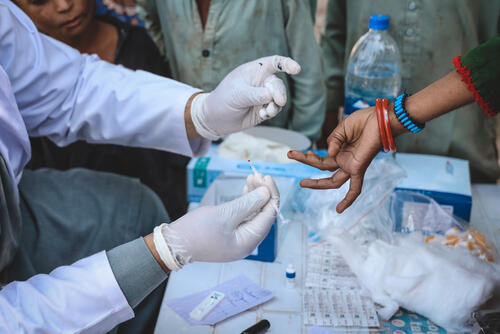
MSF emergency teams are running two mobile clinics that visit 15 different locations in the Dadu district of Sindh and have so far provided basic medical care to over 8,000 people with skin diseases, malaria, and diarrhoea. Using boats, our teams are still assessing the medical needs in nearby remote villages that have been cut off by the floodwater.
Teams have also been providing over 150,000 litres of clean drinking water per day to people taking shelter at different camps in Dadu district. Our teams have rehabilitated damaged water points and set up 120 showers and 120 latrines in the flood-affected camps in the district.
In the north of Sindh province, teams are providing medical consultations and clean drinking water in Garhi Khairo and are running mobile clinics in Thul, Jacobabad district and in the district of Shahdadkot. We have provided 1,300 outpatient consultations over three days, treating patients with malaria and malnutrition. MSF’s water and sanitation teams have installed 13 tanks and are providing clean drinking water in the displaced people camps in Sukkur city, North Sindh.
In total 1,238,000 litres of drinking water have been provided to the flood affected communities in North Sindh.
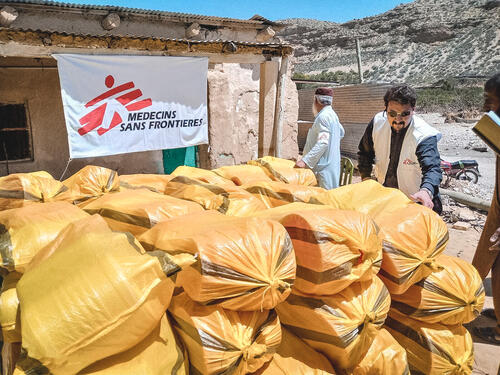
Response in Balochistan province
In eastern Balochistan province, villages are still under water and it will take a lot of time for the water to completely recede. Displaced people are living in tents and temporary makeshift shelters. In some villages the water is receding and displaced people from a few camps are returning home.
The need for clean drinking water remains critical due to widespread contamination of water sources. We are seeing people for malaria, watery diarrhoea, skin infections and malnutrition. Our teams are running four mobile clinics with outpatient consultations in Jaffarabad, Sohbatpur and Naseerabad districts. To-date, 10,165 people have received medical care from our teams.
We’re also providing safe drinking water, with more than 3 million litres having been supplied so far. In Dera Murad Jamali, teams are supporting hospital activities. Hospital admissions have nearly doubled in comparison to the months before the flooding.
In western Balochistan, our teams also providing medical care. In Chaman, over 734 people have had medical consultations and in Quetta, over 1,753 outpatient consultations have been provided. Most of these patients have respiratory infections or acute watery diarrhoea. In Quetta, 14 water tanks have been installed and 45,000 litres of clean drinking water are supplied daily. Over 640 relief kits including hygiene items, kitchen tools and mosquito nets have also been distributed to affected families.
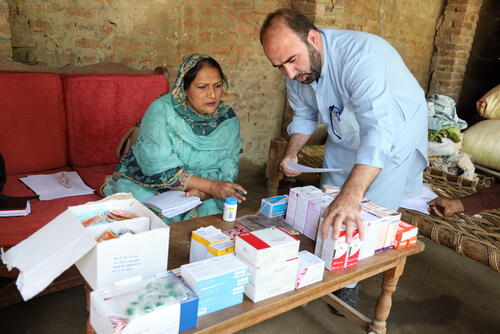
Response in Khyber Pakhtunkhuwa province
In the Charsadda and Nowshera districts, the water has receded and families are returning home, staying with relatives, and starting to rebuild their damaged houses. However, water sources remain contaminated and are contributing to water-borne diseases in the area. Our water and sanitation teams have started cleaning and repairing water facilities to tackle the source of the main medical concerns.
In Charsadda district, our four mobile clinics have seen 3,833 patients with respiratory tract infections, eye infections, acute diarrhoea, severe skin infections and chronic diseases. Around 2,600 relief kits, including kitchen sets, hygiene items and mosquito nets, were distributed to affected families. Water storage tanks, water pumps and filtration systems are being installed in villages so that people can access clean drinking water. Our teams have also started cleaning 1,500 wells in the district.
In Nowshera, we are running a mobile clinic and providing outpatient consultations. Our teams have provided basic healthcare to 500 people with water-borne diseases, acute diarrhoea, skin infections and malaria. Our teams have also distributed around 2,890 relief kits. We have also donated medical items to the hospital of Nowshera to support the isolation unit for dengue fever patients.
Needs assessment in Punjab province
Our emergency response teams have identified high needs in southern Punjab province, with people unable to access basic healthcare and safe drinking water. MSF is looking into starting emergency response activities in different locations of Rajanpur and Dare Ghazi Khan, Punjab province.



